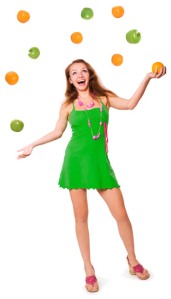 How do you feed a singing voice? What do you eat? When do you eat? What foods should you avoid?
How do you feed a singing voice? What do you eat? When do you eat? What foods should you avoid?
For a singer, eating right is a balancing act.
Food is fuel, and you need enough fuel to get through your show. But too much food could make you lethargic on stage, and the wrong kind of food could irritate your throat, ruining your performance.
So you have to juggle everything that you know about nutrition… with everything you know about your own body. This photo is by She Knows Health & Fitness, a good resource for health tips.
When people travel to far-off places, they usually relax their diets and enjoy the local cuisine. But singers do not have the same luxury. When we travel to Rome or Tokyo for an opera gig, we have to think about how the food will affect the voice.
This week, I asked my singer friends what they like to eat before a performance. I got responses from opera singers all over the world! And the results* are fascinating. Here are their answers: the 5 best foods for singing … and the 5 worst foods for singing!
5 BEST FOODS FOR SINGING
1. Water – Dehydration is a singer’s worst nightmare. Dry vocal cords are less flexible and more susceptible to damage. But don’t wait until the last minute to get a drink! The vocal folds are one of the last places in the body to get hydrated. So you can’t moisten your throat (from the inside) until you have consumed enough water to hydrate all of your vital organs. The singers in my survey reported drinking up to a gallon of water on the day before a performance. They drink more water as soon as they wake up the next morning. And they keep a couple of water bottles backstage during the performance.
2. Veggies & Fruit – Singers pile their plates full of green leafy vegetables. These help the body shed toxins and fight diseases. For optimal vocal performance, Aaron Lim, author of Your Personal Singing Guide, recommends fruits and vegetables rich in Vitamins A, C & E. One of the singers in my survey is a vegan and she selects raw foods packed with nutritional value; before singing, she drinks a green smoothie with kale or chard, juicy fruit, flax seeds, dates and water.
Fermented vegetables, like sauerkraut and kimchi, are cancer-fighting, mood-improving, probiotic superfoods! But wait until after your performance to indulge your saurkraut habit, because salty foods absorb water.
3. Protein – Just like athletes, singers need protein to maintain their strength and stamina. Many singers like fish and poultry, because they are high in protein but low in fat. But a couple of the singers in my survey reported needing iron-rich red meats on the day before a performance. Vegetarian singers prefer protein shakes and energy bars.
4. Small “Combo” Meals – Many singers eat a small meal about two hours before the curtain goes up. They can’t afford to get dizzy onstage, so they avoid sugary and starchy foods that could spike their blood sugar. Instead, the singers in my survey picked foods with a low glycemic index. They also balanced their proteins and carbs. Favorite meals included salmon and salad, eggs and toast, or chicken and rice.
5. Vocal “Lubricants”– Food and water never come in direct contact with the vocal cords. But there are some snacks that stimulate saliva production, bringing relief to singers who suffer from “dry mouth.” These include apples, lemons, hard candy and ginger tea. If you’re feeling hoarse or scratchy, a spoonful of honey will soothe your throat and fight off bacteria.
5 WORST FOODS FOR SINGING
1. Alcohol – Many people only sing in public if they’re tipsy, but opera singers finally stop singing when they drink. Here’s why: alcohol causes the tissues in the larynx to swell, reducing vocal control.
2. Heavy Foods – Singers avoid fatty foods, greasy foods, and anything that might give them gas. Remember that food is fuel, but don’t overtank! Singing depends on good breath management. If you eat too much, your digestive system will slow down and your abdominal muscles will relax and you’ll find it harder to support your air.
3. Caffeine – Caffeinated drinks steal moisture from the body. Also remember that caffeine is a real drug and it can hype you up. Performing is exciting enough by itself; you don’t want to flood your body with caffeine and adrenaline.
4. Spicy Foods – Garlic and other spices are fantastic for the immune system, but they are hard on the vocal folds. They can also irritate the stomach, causing acid reflux. You’ll also want to avoid foods with nuts or small particles that could get lodged in your throat.
When I was singing and teaching in Kathmandu, I lived on naan and tea for days at a time. Why? Because my digestive system was in shock. I couldn’t tolerate yak’s milk at all. And I loved the spicy boar, but the spicy boar didn’t love me.
5. Milk – Dairy products have been linked to sinus infections. To a singer, there is nothing worse than having a raging infection in the ears, nose and throat. For many years, we were taught that drinking milk actually produced phlegm. This turns out to be a myth, and yet some singers do get congested when they use milk products.
I was lactose intolerant until I moved to Austria, where my digestive system cured itself. (Note that this is medically impossible, but it happened anyway.) I thank Austrian cows for my current ability to eat cheese — after all, Austrian cows appear to be happier and healthier than American cows, and they have better cowbells, so I think they deserve the credit. 😉
It’s best not to be too neurotic about what you eat. Anxiety does not help you sing better. But clearly, food plays an important role in the singer’s life. If you want to stay in peak vocal condition, you need to choose your meals wisely. And that concludes this episode of the Diva Diet. Bon appétit!
* Please note that this was an informal survey with a very small sample size. It does not attempt to be a formal study with statistical significance.




